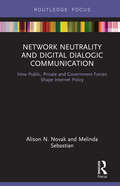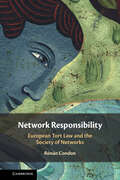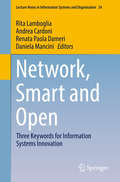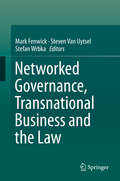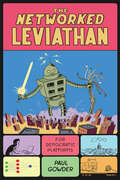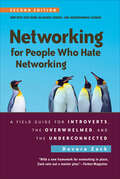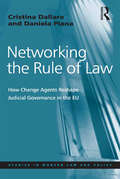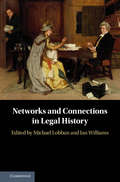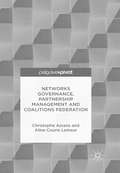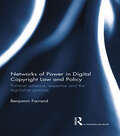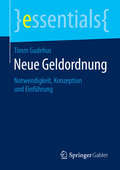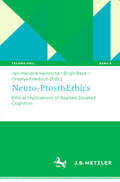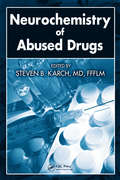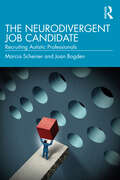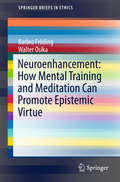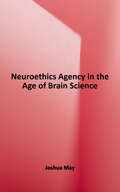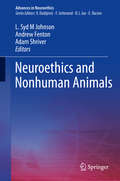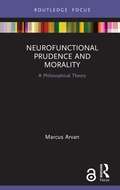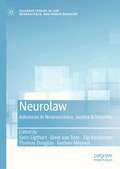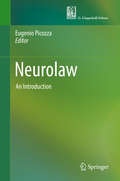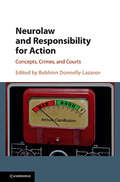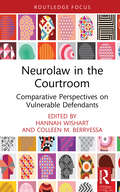- Table View
- List View
Network Neutrality and Digital Dialogic Communication: How Public, Private and Government Forces Shape Internet Policy (Routledge Studies in Media Law and Policy)
by Alison N. Novak Melinda SebastianIn the months after the Federal Communications Commission’s (FCC) 2017 decision to repeal network neutrality as US policy, it is easy to forget the decades of public, organizational, media and governmental struggle to control digital policy and open access to the internet. Using dialogic communication tactics, the public, governmental actors and organizations impacted the ruling through YouTube comments, the FCC online system and social network communities. Network neutrality, which requires that all digital sites can be accessed with equal speed and ability, is an important example of how dialogic communication facilitates public engagement in policy debates. However, the practice and ability of the public, organizations and media to engage in dialogic communication are also greatly impacted by the FCC’s decision. This book reflects on decades of global engagement in the network neutrality debate and the evolution of dialogic communication techniques used to shape one of the most relevant and critical digital policies in history.
Network Responsibility: European Tort Law and the Society of Networks
by Rónán CondonThe contemporary landscape of transnational political economy is dominated by networks. Public and private networks, and networks that combine public and private actors, cross borders, exert regulatory power and their activities often harm third parties. However, tort law as a traditional source of remediation for third party harms appears impotent when faced with the problem of regulating the 'society of networks'. This book, using a systems theory framework, retraces the emergence of tort law in modernity and highlights how two models of normative ascription - personal responsibility and organizational liability - have come to shape existing tort law's ambivalence towards network phenomena. This book breaks new ground by leaving behind the national law 'frame of reference', drawing on the conceptual promise of EU law to develop a concept of 'network responsibility' for a network society and lays the foundations of a tort law for the 21st century.
Network, Smart and Open
by Rita Lamboglia Andrea Cardoni Renata Paola Dameri Daniela ManciniThis book presents a collection of original research papers addressing the relationship between information systems (IS) and innovation. “Open”, “Smart” and “Network” are three keywords that are currently guiding information systems (IS) innovation, enhancing IS potentialities and their ability to support decision-making processes. The book discusses the relevance of these three new concepts in connection with technological and organizational innovations (i.e. cloud, smart technologies and networking), and the role they play in the development of accounting and management information systems.The book’s primary aim is to investigate how these innovations could influence information systems (with a particular focus on accounting and management information systems) by enhancing their information potentialities and improving accounting methodologies, performance measurement systems, data management, information systems architectures, and external and internal reporting.The book is based on a selection of the best papers—original double-blind reviewed contributions—presented at the 2016 Annual Conference of the Italian Chapter of the Association for Information Systems (AIS).
Networked Governance, Transnational Business and the Law
by Mark Fenwick Steven Van Uytsel Stefan WrbkaThis book brings together a unique range of case studies focusing on networks in the context of business regulation. The case studies form the basis for an interdisciplinary dialogue on the meaning, value and the limits of the 'network concept' as a tool for understanding and critically evaluating the emergent transnational legal order.
The Networked Leviathan: For Democratic Platforms
by Paul GowderGovernments and consumers expect internet platform companies to regulate their users to prevent fraud, stop misinformation, and avoid violence. Yet, so far, they've failed to do so. The inability of platforms like Facebook, Google, and Amazon to govern their users has led to stolen elections, refused vaccines, counterfeit N95s in a pandemic, and even genocide. Such failures stem from these companies' inability to manage the complexity of their userbases, products, and their own incentives under the eyes of internal and external constituencies. The Networked Leviathan argues that countries should adapt the institutional tools developed in political science for platform governance to democratize major platforms. Democratic institutions allow knowledgeable actors to freely share and apply their understanding of the problems they face while leaders more readily recruit third parties to help manage their decision-making capacity. This book is also available Open Access on Cambridge Core. For more information, visit https://networked-leviathan.com.
Networking for People Who Hate Networking: A Field Guide For Introverts, the Overwhelmed, and the Underconnected
by Devora ZackWould you rather get a root canal than face a group of strangers? Does the phrase &“working a room&” make you want to retreat to yours? Devora Zack, an avowed introvert and successful consultant who gives presentations to thousands of people at dozens of events annually, feels your pain. She found that other networking books assume that to succeed, you have to act like an extrovert. Not at all. There is another way. Zack politely examines and then smashes to tiny fragments the &“dusty old rules&” of standard networking advice. She shows how the very traits that make many people hate networking can be harnessed to forge an approach more effective and user-friendly than traditional techniques. This edition adds new material on applying networking principles in personal situations, handling interview questions, following up—what do you do with all those business cards?—and more. Networking enables you to accomplish the goals that are most important to you. But you can't adopt a style that goes against who you are—and you don't have to. As Zack writes, &“You do not succeed by denying your natural temperament; you succeed by working with your strengths.&”
Networking the Rule of Law: How Change Agents Reshape Judicial Governance in the EU (Studies in Modern Law and Policy)
by Cristina Dallara Daniela PianaJudicial networks have proved effective in influencing recent judicial policies enacted by both old and new EU member states. However, this influence has not been standard. This volume seeks to improve our understanding of how networks function, as well as the extent they matter in the governance of a constitutional democracy. The authors examine the judicial function of networks, the way they cross the legal and territorial borders that confine the jurisdiction of the domestic institutions, and whether or not they are independent of the capacity and the leadership of their members. A highly salient issue in contemporary law and politics, judicial networks are now qualified actors of governance. With the aim to understand how, to what extent, and with what consequences networks interact with hierarchical institutions that still exist within the States, this book is essential reading for legal experts, policy makers engaged in promoting the rule of law, members of the judicial networks in the EU and extra EU countries, as well as academics and students.
Networks and Connections in Legal History
by Michael Lobban Ian WilliamsNetwork and Connections in Legal History examines networks of lawyers, legislators and litigators, and how they shaped legal development in Britain and the world. It explores how particular networks of lawyers - from Scotland to East Florida and India - shaped the culture of the forums in which they operated, and how personal connections could be crucial in pressuring the legislature to institute reform - as with twentieth century feminist campaigns. It explores the transmission of legal ideas; what happened to those ideas was not predetermined, but when new connections were made, they could assume a new life. In some cases, new thinkers made intellectual connections not previously conceived, in others it was the new purposes to which ideas and practices were applied which made them adapt. This book shows how networks and connections between people and places have shaped the way that legal ideas and practices are transmitted across time and space.
Networks Governance, Partnership Management and Coalitions Federation (Governance and Public Management)
by Christophe Assens Aline Courie LemeurThis book explores the governance of networks. A network's governance mechanisms are based on trust and confidence, which go beyond a simple economic logic. As the network's boundaries expand to include clusters of businesses and stakeholders and the emergence of coalitions of all kinds, the trust will gradually dilute and the network's unifying role will be lost. The organization then evolves into the form of a network of networks, where the challenge is to bring together coalitions. Using examples from the European Union and the Regional Health Federation of Networks, this book explores the political and socio-economic challenges, including the decision making and division of tasks, faced by network organizations which move to a federation model of governance.
Networks in Telecommunications
by Daniel F. Spulber Christopher S. YooNetworks in Telecommunications addresses fundamental issues in discussions of regulatory policy by offering an integrated framework for understanding the economics and law of networks. It extends theories on network design associated with the mathematics of graph theory, which provides insights into the complex, systemic interrelationship between network components. It also applies the principles of transaction cost economics to analyze decisions about the appropriate boundaries of proprietary network architecture. The book introduces network theory to the study of the economics and law of telecommunications. The discussion opens up the black box of the cost function in telecommunications. The analysis also goes beyond the "network externalities" approach that focuses primarily on the size of networks. The book highlights the effects of network architecture and the tradeoffs inherent in network design
Networks of Power in Digital Copyright Law and Policy: Political Salience, Expertise and the Legislative Process
by Benjamin FarrandIn this book, Benjamin Farrand employs an interdisciplinary approach that combines legal analysis with political theory to explore the development of copyright law in the EU. Farrand utilises Foucault’s concept of Networks of Power and Culpepper’s Quiet Politics to assess the adoption and enforcement of copyright law in the EU, including the role of industry representative, cross-border licensing, and judicial approaches to territorial restrictions. Focusing in particular on legislative initiatives concerning copyright, digital music and the internet, Networks of Power in Digital Copyright Law and Policy: Political Salience, Expertise and the Legislative Process demonstrates the connection between copyright law and complex network relationships. This book presents an original socio-political theoretical framework for assessing developments in copyright law that will interest researchers and post-graduate students of law and politics, as well as those more particularly concerned with political theory, EU and copyright law.
Neue Geldordnung: Notwendigkeit, Konzeption und Einführung (essentials)
by Timm GudehusTimm Gudehus begründet in diesem essential die Notwendigkeit einer neuen Geldordnung und beschreibt ihre Vorteile und Chancen. Die Ausführungen sollen dazu anregen, die vorliegenden Vorschläge für eine neue Geldordnung kritisch zu prüfen, bessere Lösungen zu entwickeln, die Einführungsmöglichkeiten zu diskutieren und offene Fragen zu beantworten. Das Werk richtet sich an alle, die verstehen wollen, wie das heutige Geldsystem funktioniert, und die an der Entwicklung und Einführung einer Geldordnung mitwirken möchten, mit der sich die zentralen Probleme des heutigen Geldsystems beheben und die Gefahren unseres Wirtschafts- und Finanzsystems begrenzen lassen.
Neue Technologien – neue Kindheiten?: Ethische und bildungsphilosophische Perspektiven (Techno:Phil – Aktuelle Herausforderungen der Technikphilosophie #3)
by Marc Fabian Buck Johannes Drerup Gottfried SchweigerZu den wichtigen sozialen Einflussgrößen, die nicht nur die Konstruktion, sondern auch die Realität und Praxis institutionalisierter Kindheit(en) mitbestimmen, gehören, so der Ausgangspunkt und der Gegenstand dieses Bandes, technologische Entwicklungen und die Anwendung und Nutzung von Techniken in der Kindheit für und durch Kinder. Technische Arrangements und Praktiken sind während der Kindheit omnipräsent. In diesem Band werden systematische ethische und erziehungs-, bildungs- und kindheitsphilosophische Fragen diskutiert, die sich im Umgang mit neuen Technologien und Techniken stellen. Hierzu zählen z.B. Fragen der folgenden Art: Wie sind (Neben-)Folgen der Einführung von AI-Systemen in Unterricht und Schule zu verstehen und zu bewerten? Dürfen Eltern die Fotos ihrer Kinder auf Facebook teilen? Welche Möglichkeiten und Fallstricke bietet die Nutzung von Robotern in pädagogischen Kontexten? Welche Rolle spielen neue Technologien bei der Gestaltung des Generationenverhältnisses und für technisch vermittelte und realisierte „Regime der Kindheit“?
Neue Wege zur Durchsetzung des Verbraucherrechts
by Hans Schulte-Nölke Bundesministerium Der JustizDer Band beschäftigt sich mit der Durchsetzung von Verbraucherrechten und durchleuchtet kritisch das bisherige System in Deutschland aus ökonomischer, rechtsvergleichender und verwaltungswissenschaftlicher Perspektive. Derzeit müssen Verbraucher oder Verbände in Deutschland Verbraucherrechte zumeist selbst aktiv auf dem Zivilrechtsweg bei Gericht durchsetzen. Behördliche Zuständigkeiten bestehen in nur wenigen Bereichen wie zum Beispiel im Energie- und Telekommunikationsrecht sowie bei Finanzdienstleistungen.Anlässlich der Verbraucherrechtstage 2016 hat das Bundesministerium der Justiz und für Verbraucherschutz zusammen mit renommierten und sachkundigen Gästen ausgelotet, ob und in welchen Fällen es sinnvoll sein kann, neue, ergänzende Kompetenzen für Behörden zu schaffen, damit kollektive Verbraucherrechte besser als bisher durchgesetzt werden können. Ein vergleichender Blick fiel dabei auch auf entsprechende Instrumente in ausgewählten EU-Mitgliedstaaten (Niederlande, Großbritannien) und den USA. Die diskutierten Themen sind Inhalt dieses Bandes.
Neuro-ProsthEthics: Ethical Implications of Applied Situated Cognition (Techno:Phil – Aktuelle Herausforderungen der Technikphilosophie #9)
by Jan-Hendrik Heinrichs Birgit Beck Orsolya FriedrichThe volume focusses on the ethical dimensions of the technological scaffold embedding human thought and action, which has been brought to attention of the cognitive sciences by situated cognition theories. There is a broad spectrum of technologies co-realising or enabling and enhancing human cognition and action, which vary in the degree of bodily integration, interactivity, adaptation processes, of reliance and indispensability etc. This technological scaffold of human cognition and action evolves rapidly. Some changes are continuous, some are eruptive. Technologies that use machine learning e.g. could represent a qualitative leap in the technological scaffolding of human cognition and actions. The ethical consequences of applying situated cognition theories to practical cases had yet to find adequate attention and are elucidated in this volume.
Neurochemistry of Abused Drugs
by Steven B. KarchExtracted from the Drug Abuse Handbook, 2nd edition, to give you just the information you need at an affordable price.Beginning with a detailed look at individual drugs and their effects on the brain, Neurochemistry of Abused Drugs considers the changes in neurotransmitter levels and discusses the relationship of these
The Neurodivergent Job Candidate: Recruiting Autistic Professionals
by Joan Bogden Marcia ScheinerThis book provides guidance on recruiting, interviewing, and onboarding practices that will allow employers to successfully hire neurodivergent professionals into inclusive, competitive employment. Today, 35% of 18-year-olds with an autism spectrum diagnosis attend college, yet they have a 75–85% under-employment and unemployment rate after graduation. While organizations are looking to expand their diversity and inclusion hiring efforts to include neurodivergent professionals, current recruiting and interviewing practices in general are not well-suited to this. With over one-third of the US population identifying as neurodivergent, employers need to address how to attract this talent pool to take advantage of a meaningful segment of the workforce. Readers of this book will gain an understanding of how to guide their organizations through the creation of recruiting, interviewing, and onboarding processes tailored to neurodivergent professionals in any field. Written by authors with extensive experience working in the corporate world and consulting with Fortune 1000 companies on autism hiring efforts, this book is targeted at employers, acknowledging their perspective. Structured as a reference guide for busy recruiters, hiring managers, and supervisors, this book can be read in its entirety, in relevant sections as needed, or used as a refresher whenever necessary. This book also provides a background on the thinking styles of autistic individuals, giving the reader a deeper understanding of how to best support neurodivergent jobseekers.
Neuroenhancement: how mental training and meditation can promote epistemic virtue.
by Barbro Fröding Walter OsikaThis book explores how one can bring about changes in the brain through meditation, both through attention-focus training and through compassion training. Recent findings in the natural sciences have confirmed that it is possible for humans to achieve these structural and functional changes through various life-style practices. It is argued that meditation enables us to influence some aspects of our biological make-up and, for example, could boost our cognitive flexibility as well as our ability to act compassionate. Such changes are likely to facilitate the instilling of a number of epistemic virtues which have great bearing on our quality of life. This book offers the reader an accessible introduction to a set of neuro-enhancement methods, with a special focus on meditation techniques, and explores how such practices could contribute to make us better decision-makers and improve our moral virtues. The book is suitable for anyone looking for a text discussing the effects of neuro-enhancement from a secular ethics perspective.
Neuroethics: Agency in the Age of Brain Science
by Joshua MayIs free will an illusion? Is addiction a brain disease? Should we enhance our brains beyond normal? Neuroethics blends philosophical analysis with modern brain science to address these and other critical questions through captivating cases. The result is a nuanced view of human agency as surprisingly diverse and flexible. With a lively and accessible writing style, Neuroethics is an indispensable resource for students and scholars in both the sciences and humanities.
Neuroethics and Nonhuman Animals (Advances in Neuroethics)
by Andrew Fenton L. Syd M Johnson Adam ShriverThis edited volume represents a unique addition to the available literature on animal ethics, animal studies, and neuroethics. Its goal is to expand discussions on animal ethics and neuroethics by weaving together different threads: philosophy of mind and animal minds, neuroscientific study of animal minds, and animal ethics. Neuroethical questions concerning animals’ moral status, animal minds and consciousness, animal pain, and the adequacy of animal models for neuropsychiatric disease have long been topics of debate in philosophy and ethics, and more recently also in neuroscientific research. The book presents a transdisciplinary blend of voices, underscoring different perspectives on the broad questions of how neuroscience can contribute to our understanding of nonhuman minds, and on debates over the moral status of nonhuman animals. All chapters were written by outstanding scholars in philosophy, neuroscience, animal behavior, biology, neuroethics, and bioethics, and cover a range of issues and species/taxa. Given its scope, the book will appeal to scientists and students interested in the debate on animal ethics, while also offering an important resource for future researchers. Chapter 13 is available open access under a CC BY 4.0 license at link.springer.com.
Neurofunctional Prudence and Morality: A Philosophical Theory (Routledge Focus on Philosophy)
by Marcus ArvanPhilosophers across many traditions have long theorized about the relationship between prudence and morality. Few clear answers have emerged, however, in large part because of the inherently speculative nature of traditional philosophical methods. This book aims to forge a bold new path forward, outlining a theory of prudence and morality that unifies a wide variety of findings in neuroscience with philosophically sophisticated normative theorizing. The author summarizes the emerging behavioral neuroscience of prudence and morality, showing how human moral and prudential cognition and motivation are known to involve over a dozen brain regions and capacities. He then outlines a detailed philosophical theory of prudence and morality based on neuroscience and lived human experience. The result demonstrates how this theory coheres with and explains the behavioral neuroscience, showing how each brain region and capacity interact to give rise to prudential and moral behavior. Neurofunctional Prudence and Morality: A Philosophical Theory will be of interest to philosophers and psychologists working in moral psychology, neuroethics, and decision theory.
Neurolaw: Advances in Neuroscience, Justice & Security (Palgrave Studies in Law, Neuroscience, and Human Behavior)
by Gerben Meynen Sjors Ligthart Dave Van Toor Tijs Kooijmans Thomas DouglasThis edited book provides an in-depth examination of the implications of neuroscience for the criminal justice system. It draws together experts from across law, neuroscience, medicine, psychology, criminology, and ethics, and offers an important contribution to current debates at the intersection of these fields. It examines how neuroscience might contribute to fair and more effective criminal justice systems, and how neuroscientific insights and information can be integrated into criminal law in a way that respects fundamental rights and moral values.The book’s first part approaches these questions from a legal perspective, followed by ethical accounts in part two. Its authors address a wide range of topics and approaches: some more theoretical, like those regarding the foundations of punishment; others are more practical, like those concerning the use of brain scans in the courtroom. Together, they illustrate the thoroughly interdisciplinary nature of the debate, in which science, law and ethics are closely intertwined. It will appeal in particular to students and scholars of law, neuroscience, criminology, socio-legal studies and philosophy.Chapter 8 is available open access under a Creative Commons Attribution 4.0 International License via link.springer.com.
Neurolaw
by Eugenio PicozzaThis volume illustrates to the public, and legal experts, the basic principles of the field of neuroscience, that commonly goes under the name of Neurolaw. First, it illustrates the relationship between neuroscience, natural sciences and social sciences. Furthermore, it highlights numerous problems concerning the fundamental philosophical concepts used by Neurolaw and evaluates the validity of the method and the limits of a neuroscientific approach to the problems of law and justice. The volume explores the possibility of application of these concepts on the fundamentals of the general theory of law and legal dogmatics. It also examines the main problems of Neurolaw in relation to public, private, criminal and procedural law. In conclusion, the book follows a systematic method that makes it an thorough manual for the introduction to Neurolaw.
Neurolaw and Responsibility for Action: Concepts, Crimes, and Courts
by Dennis Patterson Peter Raynor Donnelly-Lazarov BebhinnLaw regulates human behaviour, a phenomenon about which neuroscience has much to say. Neuroscience can tell us whether a defendant suffers from a brain abnormality or injury, and it can correlate these neural deficits with criminal offending. Using fMRI and other technologies it might indicate whether a witness is telling lies or the truth. It can further propose neuro-interventions to ‘change’ the brains of offenders and so to reduce their propensity to offend. And, it can make suggestions about whether a defendant knows or merely suspects a prohibited state of affairs, so drawing distinctions among the mental states that are central to legal responsibility. Each of these matters has philosophical import; is a neurological ‘deficit’ inculpatory or exculpatory; what is the proper role for law if the mind is no more than the brain; is lying really a brain state, and can neuroscience really ‘read’ the brain? In this edited collection, leading contributors to the field provide new insights on these matters, bringing to light the great challenges that arise when disciplinary boundaries merge.
Neurolaw in the Courtroom: Comparative Perspectives on Vulnerable Defendants (Routledge Contemporary Issues in Criminal Justice and Procedure)
by Hannah Wishart and Colleen M. BerryessaThis collection presents a comparative perspective on interdisciplinary issues that fall under the emerging field of Neurolaw. The chapters embrace distinct procedural and evidential issues in the courtroom for vulnerable defendants, such as immature defendants, mentally disordered offenders and unfit-to-plead defendants, through a neuroscientific lens. This view is informed by worldwide analyses from legal academics, philosophers, and legal practitioners. The work brings together interdisciplinary and leading perspectives to discuss the use and relevancy of neuroscience at trial, and how the use of neuroscience is currently benefiting and impacting vulnerable defendants in global criminal trials. As such, the book builds upon and adds to the existing literature in this field by providing a comprehensive coverage of the intersection between these disciplines for vulnerable defendants in the courtroom. Key issues covered include: vulnerable defendants and the pre-trial process; the trial process; the use of neuroscience as expert evidence at trial; and vulnerable defendants, neuroscience and mitigation of sentence. Through original exploration presented by contributors from both academia and practice, the book will be of interest to academics, researchers and policy-makers working in the areas of Criminal Law and Procedure.
